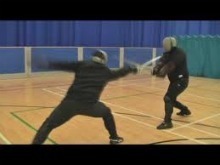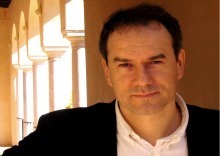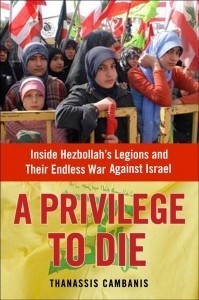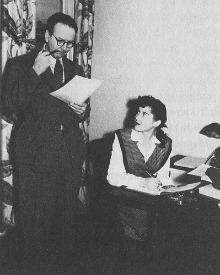Matt Rees's Blog, page 21
November 4, 2010
Gentleman and thug: researching my new historical novel
 One of the great pleasures of novel-writing is the research which, for almost every book, ought to bring the writer to investigate different areas of inquiry. To become a swift expert in something others might spend all their lives studying.
One of the great pleasures of novel-writing is the research which, for almost every book, ought to bring the writer to investigate different areas of inquiry. To become a swift expert in something others might spend all their lives studying.That’s why I’ve taken up my sword.
I’m working on a historical novel about the great Italian artist Caravaggio. That has meant learning to paint with oils, which has been even more enjoyable than learning piano while writing MOZART’S LAST ARIA, the novel I have coming out in 2011. But Caravaggio wasn’t only a painter. He was also infamous for killing a man in a rapier duel.
Hence my visit to the Academy of Historical Fencing on my recent trip to the UK, where I learned that the rather dandified image of dueling is somewhat over-romanticized. “You could fight like a gentleman or like a thug,” says Nick Thomas, one of the brothers who founded the Academy. “But it was all about killing, in the end. So it could be said that the thug predominates.”
Nick is a delightfully obsessed martial arts fan who learned Renaissance Italian so he could translate his favorite fencing manual (Ridolfo Capo Ferro’s 1610 masterpiece the “Gran Simulacro”) and has won many European rapier competitions. By day he and his brother write zombie fiction (their latest is about "Sherlock Holmes and the Zombie Problem"). With several friends, he founded the Academy in 1996. They run classes in Bristol, England, and my hometown of Newport, Wales. So after putting my son to bed, I picked up my Dad in my rental car and zipped out to Caerleon University, where Nick awaited in the gym with his swords and daggers.
Read the rest of this post on my blog The Man of Twists and Turns.
Published on November 04, 2010 07:28
•
Tags:
academy-of-historical-fencing, bristol, caerleon, caerleon-university, caravaggio, crime-fiction, england, fencing, historical-fiction, mozart-s-last-aria, newport, nick-thomas, rapier, renaissance-italy, ridolfo-capo-ferro, sword-fighting, wales
October 17, 2010
Compelling seeds of true history: Philip Sington’s Writing Life interview
 The best historical novels are based on some element of real history which has been either neglected or is little known. Philip Sington’s “The Einstein Girl” grows out of the revelation that Albert Einstein had a secret daughter. Sington takes that seed and, with the hand of a true thriller master, builds around it a story of psychiatry and love in the early days of Hitler’s Germany. It's one of the most beautiful and harrowing stories you’ll read. I met Philip, who was born in Cambridge, England, in 1962, on a recent evening in Darmstadt, Germany, where we both read excerpts from our books – in a church, on top of the tombs of the ancient Landgraves of Hesse. After hearing him read, I immediately took up “The Einstein Girl” and was utterly swept away by it. Here Philip discusses his Writing Life:
The best historical novels are based on some element of real history which has been either neglected or is little known. Philip Sington’s “The Einstein Girl” grows out of the revelation that Albert Einstein had a secret daughter. Sington takes that seed and, with the hand of a true thriller master, builds around it a story of psychiatry and love in the early days of Hitler’s Germany. It's one of the most beautiful and harrowing stories you’ll read. I met Philip, who was born in Cambridge, England, in 1962, on a recent evening in Darmstadt, Germany, where we both read excerpts from our books – in a church, on top of the tombs of the ancient Landgraves of Hesse. After hearing him read, I immediately took up “The Einstein Girl” and was utterly swept away by it. Here Philip discusses his Writing Life:How long did it take you to get published?
I got a deal with my second book, which I finished about seven years after starting the first. Between the two enterprises there was a bit of a gap, though.
Would you recommend any books on writing?
I never read any books on writing when I was starting out. That was probably a mistake. The best book I’ve seen subsequently is Master Class in Writing Fiction by Adam Sexton (published by McGraw Hill). You’re supposed to read a particular novel before each chapter, which is a good approach.
What’s a typical writing day?
Someone once said that the writing life involves brief intervals of creativity punctuated by long intervals of staring into the fridge. That about sums it up in my case. That said, since becoming a father three years ago, I’ve had to cut down on the fridge time.
Plug your latest book. What’s it about? Why’s it so great?
The Einstein Girl is a historical novel inspired by the relatively recent discovery that Albert Einstein had a daughter in secret. It’s set in 1932, on the eve of the Nazi assumption of power, when Einstein was poised to flee Europe for America, and unfolds as a psychological mystery. I was inspired to write it because, in the course of my researches, I began to see some fascinating parallels between Einstein’s intellectual obsessions and his highly unusual private life.
How much of what you do is:
a) formula dictated by the genre within which you write?
b) formula you developed yourself and stuck with?
c) as close to complete originality as it’s possible to get each time?
In sketching out a book I’m guided more by instinct than anything. I think that’s something writers develop over time, and which becomes sharper the more they write. I don’t think I’ve ever adjusted a story because I don’t see it conforming to a model. More likely I’ll adjust it because I don’t find it satisfying or compelling enough.
What’s your favorite sentence in all literature, and why?
Did I mention that when I was fifteen I took it out of my pants and whacked off on the 107 bus from New York?
Philip Roth, Portnoy’s Complaint.
If you are going to indulge in rhetorical questions, make them good ones.
Read the rest of this post on my blog The Man of Twists and Turns.<\a>
Published on October 17, 2010 00:51
•
Tags:
adam-sexton, albert-einstein, crime-fiction, germany, historical-fiction, hitler, humbert-humbert, interviews, lolita, master-class-in-writing-fiction, philip-roth, philip-sington, portnoy-s-complaint, the-einstein-girl, writing-life
October 15, 2010
Crime fiction’s ‘French porn’: Martin Walker’s Writing Life interview
 Martin Walker’s series of crime novels about the chief of police of a small town in the beautiful Perigord region of France are a delight. When we met at a recent “British Crime Fiction Night” in Darmstadt, Germany, he described the books as “French porn – wine, food, women – in a crime fiction frame.” Certainly Martin’s bon vivant personality matches the playfulness of his fiction (Though he's a Scot by birth, he divides his time between Washington DC and his vineyard in France). But he’s also a former correspondent with The Guardian and his novels have significant undertones of social commentary, as you’ll see from the interview here. By mixing the pleasures of France – the “porn” – with its dark underside, the Bruno novels remind me very much of the terrific Inspector Montalbano series, where the Sicilian setting is the beautiful backdrop to a detective who enjoys a good dinner as much as nabbing the villain. So here’s Martin Walker, the Andrea Camilleri of the Dordogne.
Martin Walker’s series of crime novels about the chief of police of a small town in the beautiful Perigord region of France are a delight. When we met at a recent “British Crime Fiction Night” in Darmstadt, Germany, he described the books as “French porn – wine, food, women – in a crime fiction frame.” Certainly Martin’s bon vivant personality matches the playfulness of his fiction (Though he's a Scot by birth, he divides his time between Washington DC and his vineyard in France). But he’s also a former correspondent with The Guardian and his novels have significant undertones of social commentary, as you’ll see from the interview here. By mixing the pleasures of France – the “porn” – with its dark underside, the Bruno novels remind me very much of the terrific Inspector Montalbano series, where the Sicilian setting is the beautiful backdrop to a detective who enjoys a good dinner as much as nabbing the villain. So here’s Martin Walker, the Andrea Camilleri of the Dordogne.How long did it take you to get published?
Not long at all. My first book, non-fiction, was commissioned. My first Bruno novel sold as soon as my agent offered it.
Would you recommend any books on writing?
No. Just read and read and read and get a feel for what works.
What’s a typical writing day?
There isn’t one, but whether on a plane or a train or at home or in a hotel I try and do at least a thousand words a day.
Plug your latest book. What’s it about? Why’s it so great?
The latest book is ‘The Dark Vineyard,’ third in the Bruno series, which is about fraud in the truffle market in France, which traces back to China and to consequences of France’s 1954 defeat in its failed colonial war in Vietnam. Along the way, it involves militant Greens, a lot of wonderful French food and the complex romantic life of my hero, Bruno. I think it’s my best Bruno novel yet, because he seems to grow as a character with each book and my portrait of modern France gets richer. While writing it, I more than once had that magical experience of a character doing something I had neither planned nor expected, as if Bruno was taking on a life of his own.
Read the rest of this post on my blog The Man of Twists and Turns.<\a>
Published on October 15, 2010 23:51
•
Tags:
andrea-camilleri, bruno-chief-of-police, cj-sansom, crime-fiction, dordogne, france, ian-rankin, inspector-montalbano, interviews, martin-walker, neal-stephenson, perigord, philip-roth, the-guardian, the-writing-life, washington-dc, writers
October 13, 2010
Love and the crime novel
 The crime novel tradition seems to have little connection to love. Maybe sometimes love in a perverse sense is the spur to the murder at the heart of most crime novels – the spurned husband killing his wife, for example. But usually the detective is a loveless loner, pining without much hope like the great Marlowe for his true love to come along.
The crime novel tradition seems to have little connection to love. Maybe sometimes love in a perverse sense is the spur to the murder at the heart of most crime novels – the spurned husband killing his wife, for example. But usually the detective is a loveless loner, pining without much hope like the great Marlowe for his true love to come along.As I write more novels, I’ve noticed that love is at the heart of crime fiction. At least, mine, anyway.
Leonard Cohen sings that “love’s the only engine of survival.” It’s a good way to look at the crime novel. Rather than being a race to unravel the murder puzzle and nab the killer, I view the crime novel as the detective’s journey toward understanding about himself. And understanding, in my experience, comes only with the unfolding of love. You can finger the killer and take away the danger he poses, but unless your detective learns about love, emotionally he won’t survive the trauma of his closeness to death.
It may seem that I ought to have figured this out before now – I’m close to completion of the manuscript of my sixth novel, after all. But society hides the centrality of love behind strictures of finance and duty and work, and the format of the crime novel often plays the same role. So it’s only now, 400,000 words down the line, that it’s clear to me.
I started out thinking of crime novels as marked by plot – a murder, an investigation, a discovery of the bad guy – alongside a deeper emotional characterization of the hero and as many of the other characters as I could manage.
Then as my novels went on, the importance of relationships between the characters started to grow more sigificant in the way I conceputalized them. I realized that it was these relationship which gave the novel structure and meaning, rather than the Three Act concept (dilemma, discovery, resolution) of most writing texts. The Three Acts were the superstructure, if you like, but no more.
Read the rest of this post on my blog The Man of Twists and Turns.<\a>
Published on October 13, 2010 23:58
•
Tags:
bethlehem, brooklyn, crime-fiction, detective-fiction, leonard-cohen, new-york, omar-yussef, philip-marlowe, the-collaborator-of-bethlehem, the-fourth-assassin
October 11, 2010
Paving Zion to put up a parking lot
 Intifada fans can breathe a little more easily.
Intifada fans can breathe a little more easily.Just when it seemed as though no amount of building in Israel’s settlements and harsh statements at the United Nations by the country’s foreign minister could truly provoke new violence between Israelis and Palestinians, the Jerusalem municipality came up with something guaranteed to steam up some hotheads.
The city’s planning committee is considering a proposal to build an underground parking lot for the Old City by breaching the 16th-century walls of Suleiman the Magnificent and digging into the rock beneath the ancient Jewish Quarter.
“This is illegal,” said Ghassan Khatib, director of the Palestinian Authority’s government media center in Ramallah. “These illegal changes would provoke the Palestinians and many others, Muslims and Christians. This will aggravate the tension between Israelis and Palestinians and have a negative effect on current international efforts to renew the political process.”
Over the years, Palestinians and Islamists have called for violence to protect, as they put it, the Old City from alleged Israeli plots to undermine it and bring the Aqsa Mosque, considered the third holiest shrine in Islam, tumbling down. Such conspiracies always seemed somewhat far-fetched, though nonetheless effective for all that.
This time, Jerusalem’s city government seems set on mirroring some aspects of the most vivid Palestinian paranoia.
For the rest of this post, read my blog The Man of Twists and Turns.<\a>
Published on October 11, 2010 05:59
•
Tags:
aqsa-mosque, armenian-quarter, christian-quarter, dung-gate, ghassan-khatib, global-post, herod-s-temple, intifada, israel, israelis, jaffa-gate, jerusalem, jerusalem-municipality, jewish-quarter, journalism, kotel, muslim-quarter, new-gate, old-city, ottoman-empire, palestine, palestinians, planning, ramallah, ruth-lapidoth, suleiman-the-magnificent, turkey, unesco, zion-gate
October 7, 2010
Urinal-top video
 We were on the Hessian plain somewhere outside Frankfurt when I felt as though the drugs had taken hold.
We were on the Hessian plain somewhere outside Frankfurt when I felt as though the drugs had taken hold.Why am I paraphrasing the great Hunter S. Thompson? Because I endured an experience that Professor Gonzo could only have imagined in his wildest LSD frenzies. Something that made me feel I must be hallucinating, as if the Las Vegas of HST’s fear and loathing had come to me, cleaned up and waterless but every bit as insidious. What I saw was proof that we have no limits in our power to suck every last cent out of every possible human moment.
I was urinating. Into a urinal. At a rest stop outside Germany’s business capital. When I looked down, I didn’t see the accustomed maker’s logo. No, there was a video screen. About six inches across and four inches high. Bright, bright high-definition. Built into the top of the urinal. Advertising itself as the product of Urimat.com.
They’re insidious, these Urimat people, I tell you, brother urinator. They must’ve done years of research to assess exactly where males let their eyes drop when peeing. It’s not on your unit. No, because that necessitates looking at the disgusting mess of the urinal itself, the chewing gum and receipt papers and hairs, oh God the curly hairs. We look higher than that. But not so high that we must confront the wall in front of us, with its vicious graffiti and its smears of nose-booger.
We look right at the top of the urinal, we brothers in urination. And the bastards at Urimat thought: Why waste all that time, when men are looking at nothing? Let’s make them look at a housewife, scrubbing her kitchen and bathroom. Let’s make them watch as “The dirt goes, the aroma stays.”
Can’t you picture Baron Urimat now, in his boardroom overlooking Feldbachstrasse in Feldbach, Switzerland – for this is where they have their evil mountain lair – saying to his henchmen: “When they have their dirty little units in their hands, the path to men’s minds lies open. Let us feed this psychological emptiness. Before they put themselves back in their pants and walk out without washing their hands. Let us take control of their minds.”
Can't you hear the evil cackles of laughter even now?
Read the rest of this post on my blog The Man of Twists and Turns.<\a>
Published on October 07, 2010 06:20
•
Tags:
book-tour, fear-and-loathing-in-las-vegas, germany, hunter-s-thompson, lsd, professor-gonzo, travel, urimat
October 5, 2010
Hezbollah's rapture, resistance, and revolution
 Here's my review of A Privilege to Die: Inside Hezbollah’s Legions and Their Endless War Against Israel — by Thanassis Cambanis (Free Press). The review appeared this weekend on Global Post, where I'll be doing reviews of international fiction and nonfiction each month.
Here's my review of A Privilege to Die: Inside Hezbollah’s Legions and Their Endless War Against Israel — by Thanassis Cambanis (Free Press). The review appeared this weekend on Global Post, where I'll be doing reviews of international fiction and nonfiction each month.Most books on Hezbollah tend to focus, in one way or another, on the Lebanese Shia group’s fundamentalist politics. That’s in contrast to what strikes you as a journalist when you travel to southern Lebanon, one of the Hezbollah heartlands. There the greatest impressions are visceral. The earthquake of an Israeli artillery shell, which appears to have landed on top of you until you discover that it struck two kilometers away. The stark and lonely valleys, so distant from the typical snapshot of fist-pumping Shia masses. Most of all, it is the quiet readiness of the Hezbollah fighters for death.
In his groundbreaking book, Thanassis Cambanis has all the politics — he’s excellent in explaining how Hezbollah turned apparent defeat in its 2006 war with Israel into de facto control of Lebanon within three years. But he goes beyond the typical Hezbollah tome to give you the feel of war, writing of gunfire that came from “so close that it felt like someone ripping a sheaf of paper in my ear while tickling the inside of my gut with a feather” and the “incongruously whimsical” high-pitched raspberry that is the sound of a rocket in flight. He adds revealing insights into the lives of normally secretive Hezbollah fighters.
The essence of Hezbollah’s success, as Cambanis sees it, is its ability to carve out clear answers to the vital national questions. That’s a big advantage for Hezbollah over the cloudy mass of Lebanon’s vicious sectarian parties. (One Hezbollah voter tells Cambanis his choice was based on the fact that he was “sick of all these other assholes.”)
Hezbollah’s head since 1992, Hassan Nasrallah, enforces a strict fundamentalist discipline within the party. But other supporters are allowed to enjoy broader freedom. By eschewing the hard line of Hezbollah’s earlier days, Nasrallah has brought Hezbollah’s appeal to Muslims who don’t want to live as if Lebanon were Tehran, but who wish for the pride that comes with resistance to Israel. “In a landscape of nihilism,” Cambanis writes, “Hezbollah understood the intrinsic appeal of spiritual clarity.”
That clarity is based on a set of principles Cambanis describes as “rapture, resistance, revolution.” To illustrate the first of these, he takes his title from a comment by a Lebanese man who spoke to him while he was reporting on the 2006 war: “‘It would be a privilege to die for Sayyed Hassan [Nasrallah].’”
Read the rest of this review on Global Post, where I'll be doing reviews of international fiction and nonfiction each month.
Published on October 05, 2010 07:11
•
Tags:
hassan-nasrallah, hezbollah, journalism, lebanon, middle-east, nonfiction, reviews, shia, terrorism, thanassis-cambanis, the-boston-globe, the-new-york-times
September 29, 2010
Blissfully blogless
 Last weekend, my computer played up. Suddenly I couldn’t post the fascinating blog item I had written. I couldn’t update my Facebook page.
Last weekend, my computer played up. Suddenly I couldn’t post the fascinating blog item I had written. I couldn’t update my Facebook page.The computer gave me some kind of message about a “Flash” that had “crashed.” I’m old enough to remember the sputtering rockets of Flash Gordon in the 1950s series that was rebroadcast on the BBC in the early 1970s when I was a kid. That image held off my sense of powerlessness and frustration for about a half minute.
Then I went nuts and hit myself in the head. Yes, full fist to the side of the head. As I watched the little dial on my screen telling me the computer was “still working on it”….on and on. Hit myself in the head six times.
Then I decided that it was stupid to be so frustrated over a computer. (I haven’t hit myself in the head for a decade, and that was when I was divorcing my first wife, so I consider it to be far more excusable, though no less daft.) In fact, I realized that this Flash-crash might actually save me from the attention-deficit disorder known as “writing a blog” and “having a profile online.”
I’m told these things are good for an author, to build a public awareness of his work. But what would happen if I didn’t do them? Suddenly I faced the prospect of (a) getting my computer fixed, or (b) never filing to my blog or updating Facebook or Red Room or Goodreads or Crimespace or Twitter ever again. I liked the idea of prevaricating, so (a) seemed quite possible.
Read the rest of this post on my blog The Man of Twists and Turns.
Published on September 29, 2010 22:58
•
Tags:
alex-ruehle, blog, crime-fiction, crimespace, facebook, flash-gordon, goodreads, internet, red-room, sueddeutsche-zeitung, writing-life
September 26, 2010
New arms race--on author websites
 I have a new book coming out in the UK next spring. So it’s time to start looking around to see what new web gadgets and gismos authors are expected to shell out for from their meager advances to keep their “web profile” current.
I have a new book coming out in the UK next spring. So it’s time to start looking around to see what new web gadgets and gismos authors are expected to shell out for from their meager advances to keep their “web profile” current.It’s a new arms race. Just as the Soviets bankrupted their (morally bankrupt) regime trying to keep up with US developments in mass destruction, writers have to divert their attention from the writing of books and trawl the (morally questionable) web, wondering if people will think they’re bad writers just because they didn’t hire the most expensive web designer.
Many top writers still have websites whose homepages are essentially just tacky ads for their latest book. Those are sites you’ll never return to. You go there, read the author bio, and maybe click on “BUY THE BOOK!!!” Ha, as if.
So web designers are trying to figure out ways to get you to come back to a site which, by definition, ought only to be worth visiting every year or so, when the author actually publishes a new book.
Hence, you are invited download the Haruki Murakami screensaver, or demonic Bret Easton Ellis “wallpaper,” or play a Huckleberry Finn “vocabulary game” to entice you to visit the site of Jon Clinch, author of “Finn.”
And here I thought writing my own blog and this blog and maintaining a Facebook page and tweeting and...
Read the rest of this post on my blog The Man of Twists and Turns.
Published on September 26, 2010 04:24
•
Tags:
bret-easton-ellis, crime-fiction, finn, haruki-murakami, historical-fiction, huckleberry-finn, imperial-bedrooms, internet, jon-clinch, middle-east, mozart-s-last-aria, omar-yussef, palestine, palestinian, writers, writers-websites
September 16, 2010
Writers, no email until lunch
 Raymond Chandler wrote that a writer shouldn’t read letters until lunchtime. The energy that ought to go into his novel would be diverted to correspondence.
Raymond Chandler wrote that a writer shouldn’t read letters until lunchtime. The energy that ought to go into his novel would be diverted to correspondence.If email had been invented 50 years earlier, we might never have had “The Big Sleep.”
Email has an itching urgency that letters don’t have. And a letter leads only to the end of the page – the internet clicks you on into endless pages and seemingly into other worlds. So I’m with Chandler. If you’re a writer, don’t even open your email until you’ve finished writing for the day. Given that most writers have enough creative energy for a three or four hour day tops, you’ll only have to wait until lunchtime, after all.
I’ve interviewed dozens of writers for my blog and I always ask about their writing routine. Many of them say that they dabble on the web until they “feel guilty about wasting time,” then they start writing. Trouble is, by then I think they’ve blown their concentration for the day.
Read the rest of this post on my blog The Man of Twists and Turns.<\a>
Published on September 16, 2010 01:57
•
Tags:
blogs, bronx-zoo, crime-fiction, echardt-tolle, email, internet, lady-gaga, raymond-chandler, the-big-sleep, writing, writing-schedule



